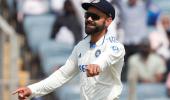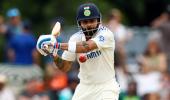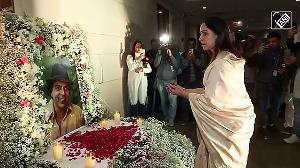Questions will remain as to why he ended his Test career at the age of 36, despite being one of the fittest cricketers, and why he didn't wait to cross the 10,000-run mark, observes veteran cricket correspondent K R Nayar.

Within days of Rohit Sharma retiring from Test cricket, Virat Kohli -- another great of Indian cricket -- has also decided to end his Test career.
After providing 14 years of sheer joy and amassing 9,230 runs from 123 Tests at an average of 46.85, he has chosen to walk away quietly.
Questions will remain as to why he ended his Test career at the age of 36, despite being one of the fittest cricketers, and why he didn't wait to cross the 10,000-run mark.
There were reports that a highly influential figure in Indian cricket -- possibly Ravi Shastri, with whom he shares a close rapport -- was expected to meet Kohli and persuade him to extend his Test career.
However, it seems Kohli was firm in his decision. It is also understood that the BCCI is keen to field a fresh, young team starting with the upcoming England tour. The Test team selection is scheduled for May 23.
Although Kohli continued to bat with authority, there had been a dip in both his form and average.
Waiting to score another 770 runs to reach the 10,000-run milestone may have seemed a daunting task.
What's disappointing in the case of both Sharma and Kohli is that fans won't get to witness them in a farewell Test match.
But does a farewell Test match really matter for a player like Kohli? Does it really make a difference whether he crosses the 10,000-run mark?
Kohli has scored centuries in both innings of a Test match, and even notched a century and a 90 in the same match.
He was the fifth-fastest in the world to reach 7,000 Test runs. As a captain, he ranks sixth globally for most matches led in Tests -- with 68 matches -- surpassing even Mahendra Singh Dhoni, who captained in 60 Tests. He has also taken 121 catches in the field.

Kohli leaves behind a legacy as one of the greatest cricketers of the modern era.
Fans watched with awe as he maintained a level of consistency that followed Sachin Tendulkar's footsteps.
While his aggressive nature sometimes bordered on unsporting, his commitment to fitness and discipline made him a true role model.
His adaptability to different conditions was unquestionable. In Australia, where batting is notoriously difficult, he has averaged over 50.
He was equally superb in South Africa, where bounce and pace didn't faze him. By scoring heavily in England, he proved that seam and swing were not obstacles either.
Kohli's hunger for runs was evident in his ability to convert good starts into big scores -- a quality many batsmen lack.
Pressure never deterred him, which is why he has often performed even in matches that India ended up losing.
His biggest asset was his technical excellence. Pace or spin, few could point to any clear weakness in him, apart from the 2014 England tour. But he overcame that flaw in the 2018 series, proving his ability to learn and adapt.
His counterattacking style, and the manner in which he found gaps in the field, were always a delight to watch.
Who can forget the 2018-2019 series triumph in Australia? His 123 on a Perth wicket will stand out always.

Among those of Kohli's innings that we've watched, the ones that will remain etched in our minds will be the 141 in Adelaide in 2014 -- in his debut Test as captain -- the 153 at the Centurion (2018), 200 in the 2016 West Indies series, and his highest score of 254 not out against South Africa in 2019 at Pune.
In fact, all his 30 centuries and 31 half centuries will forever remain a treat to watch and recall.
Kohli has ended his Test career as the fourth most prolific Indian batter in Test cricket after Tendulkar (15,921), Rahul Dravid (13,265) Sunil Gavaskar (10,122).
With seven double centuries, he tops the list of Indians with most double hundreds in Test cricket, followed by Virender Sehwag and Tendulkar with six each.
From 2019, Kohli had fewer centuries; but in 2023 he silenced his critics, although that resurgence was short-lived.
By 2024, the signs of decline were evident. In his last 19 Tests, he managed just 417 runs with only one century and one half-century, averaging 24.52.
From then on, speculation began about how much longer his Test career would last. Kohli eventually answered that question himself -- just as Sharma did.
Ending a Test career, often considered the ultimate challenge in cricket, is never easy.
For someone like Kohli, who displayed mastery over the format for 14 years, the decision must have been especially difficult.
Nonetheless, his Test career will continue to inspire aspiring cricketers. His mastery of skill, relentless drive to score, and unwavering commitment to fitness are all worth emulating.
Feature Presentation: Rajesh Alva/Rediff










